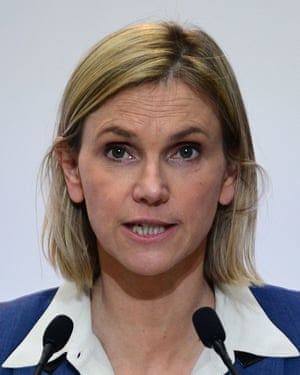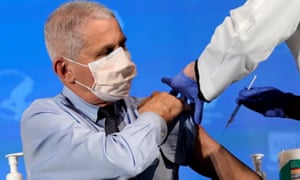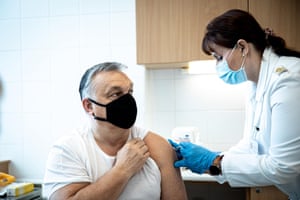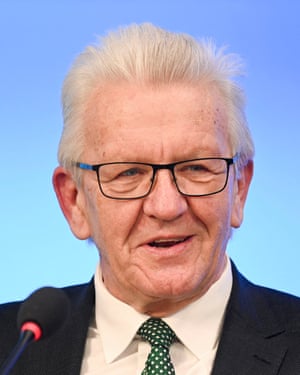
A single-shot Covid-19 vaccine by US drugmaker Johnson and Johnson is likely to be approved for use in the European Union in early March, a French minister said Sunday.
The vaccine was cleared for emergency use in the United States on Saturday, becoming the third available vaccine there. The single-shot vaccine is highly effective in preventing severe Covid-19, including against newer variants, the Food and Drug Administration (FDA) said before giving it the green light.

Agnes Pannier-Runacher. Photograph: Martin Bureau/AFP/Getty Images
French Industry Minister Agnes Pannier-Runacher told France 3 television that the European Medicines Agency (EMA) was also evaluating information transmitted by the US pharmaceuticals company.
An EU approval in early March would allow the vaccine to be rolled out in late March or early April, she said, adding this was “good news” because it offers protection with a single shot in contrast to other vaccines requiring two.
She said it was possible that a booster shot was needed later “but we can’t be sure yet”.
The EU hoped to receive 600 million doses of the vaccine by the end of June, she said.
France has so far vaccinated 1.5 million people, the minister said.
Boris Johnson has tweeted about the UK’s vaccination programme, saying: “20 million people across the UK have now got the jab – a huge national achievement and a testament to the tireless work of NHS staff, volunteers, the Armed Forces & many more. I urge everyone to get the jab when called. Every jab makes a difference in our battle against COVID.”
NHS England chief executive Sir Simon Stevens said: “Vaccinating 20 million people – including 17 million across England – in a few short weeks shows the NHS vaccination campaign is firing on all cylinders, and looking out to Easter and beyond it’s full speed ahead.
“As we can see from other parts of the world, having vaccines from the manufacturers versus actually administering them to patients can be two different things. So this latest milestone is also a tribute to careful health service planning, effective organisation and amazing teamwork across the whole of the country.”
Updated
at 10.17am EST
Families with children in school or college will be able to test themselves for coronavirus twice a week from home under plans for schools to safely reopen in England from 8 March, Rajeev Syal reports.
The story continues:
Free tests will be provided to pupils’ households, as well as those in their childcare or support bubbles, regardless of whether anyone has symptoms, the government said on Sunday.
The rapid tests will be ordered and collected from local sites or administered through workplace testing programmes, the Department of Health and Social Care (DHSC) said. Secondary and college pupils will be tested with lateral flow tests twice a week, receiving three initial tests at school before they start taking them at home.
You can read the full piece here:
In the US, Dr Anthony Fauci, the country’s top infectious disease official, said he would take the newly approved Johnson & Johnson Covid-19 vaccine as he encouraged Americans to accept any of the three approved shots.
“All three of them are really quite good, and people should take the one that’s most available to them. If you go to a place and you have J&J, and that’s the one that’s available now, I would take it,” Fauci said on NBC’s Meet the Press.

Dr Anthony Fauci prepares to receive his first dose of the Moderna Covid-19 vaccine in December. Photograph: Reuters
The US government authorised Johnson & Johnson’s single-dose Covid-19 vaccine on Saturday, making it the third to be available in the country following ones from Pfizer/BioNTech and Moderna. Both of those vaccines require two doses.
Shipments to vaccination sites of J&J vaccine are expected to begin Sunday or Monday.
Both the Pfizer and Moderna vaccines showed higher efficacy rates in trials that used two doses versus J&J’s single-shot vaccine. However, direct comparison is difficult because the trials had different goals and J&J’s was conducted while more contagious new variants of the virus were circulating.
“You now have three highly efficacious vaccines, for sure. There’s no doubt about that,” Fauci said.
Updated
at 9.57am EST
More than 20m people now vaccinated in UK
More than 20 million people in the UK have now received their first dose of coronavirus vaccinations, new figures released on Sunday showed.
Vaccines minister Nadhim Zahawi hailed the news on social media, tweeting:
Nadhim Zahawi
(@nadhimzahawi)BINGO! One Score 💉💉💉 over 20,000,000 people have had the vaccination (1s dose). What an achievement for February 2021. What a team! Proud to be with you on this journey. @NHSuk https://t.co/pwGWJLOpcb
The UK vaccination programme, widely viewed as a success, leaves the country second only to Israel in vaccinations per capita.
Health secretary Matt Hancock said vaccinating more than 20 million people against coronavirus across the UK is a “magnificent achievement for the country”.
In a video on his Twitter account, Hancock said: “I’m absolutely delighted that over 20 million people have now been vaccinated across the UK – it’s absolutely fantastic.
“I want to thank every single person who’s come forward to get the jab because we know with increasing confidence that the jab protects you, it protects your community and it also is the route out of this for all of us.”
Updated
at 9.25am EST
A further 149 people who tested positive for coronavirus have died in hospital in England, bringing the total number of confirmed deaths reported in hospitals to 83,123, NHS England said on Sunday.
Patients were aged between 23 and 103. All except six, aged between 34 and 89, had known underlying health conditions.
The deaths took place between 8 January and 27 February. There were 22 other deaths reported with no positive Covid-19 test result.
Updated
at 9.19am EST
There are “definite lessons to learn” one year on from Wales’s first case of coronavirus, the country’s health minister has said.
Vaughan Gething said Wales would “definitely have done things differently” if it had the knowledge about Covid-19 that is available now.
Since a year ago, 203,625 confirmed cases and 5,340 deaths of people with coronavirus have been reported by Public Health Wales.

Welsh health minister Vaughan Gething. Photograph: Matthew Horwood/Getty Images
Gething told BBC Wales’s Sunday Supplement programme: “When I think about when coronavirus arrived in Europe, across Europe we plainly were shocked because we hadn’t had the sort of significant impact that Sars and Mers had in other parts of the world …
“We didn’t have the same level of response that other parts of the world did, who were much more rapid to take the sort of society-wide interventions that we eventually did.”
“Looking back, we’d say with our knowledge today we definitely would have done things differently,” he told the BBC. “We’d definitely have intervened more quickly but it was still the case that the advice to me was, with the knowledge we had at the time, ‘we think we gave you the right advice’.”
The Welsh government would like to “go further” on current measures at airports, with an approach to all international travel, not just a red list, Gething said.
“I think with the learning we had now, looking back then yes, I think we would have taken different measures earlier,” he said. “I think we would have taken a more restrictive approach to international travel.”
Updated
at 9.03am EST
Germany has classed France’s Covid-battered Moselle region as a high-risk area for virus variants, triggering tougher entry requirements at the border between the two neighbours.
France’s eastern Moselle region has been listed as an area “at particularly high risk of infection due to widespread occurrence of Sars-CoV-2 virus variants”, Germany’s Robert Koch Institute for disease control announced.
From Tuesday, cross-border travellers from Moselle will need to be able to show a recent negative coronavirus test.
Germany has already introduced tough checks at its borders with the Czech Republic and Austria’s Tyrol region, ignoring calls from Brussels to keep borders within the bloc open. The checks at the Moselle crossing will be less strict, with random stops and requests for negative tests rather than every vehicle being stopped.
Updated
at 8.53am EST
Summary of recent events
Here’s a roundup of key events around the world.
• In the UK, chancellor Rishi Sunak indicated that emergency support measures such as the furlough scheme will be extended beyond the end of April in the budget on Wednesday.
• In Germany, several states called for unused AstraZeneca coronavirus vaccines to be given to younger people, amid a low uptake of doses among the older population because of concerns, in contradiction of EU-wide guidance, over the safety of the AstraZeneca vaccine for over-65s.
• President Andres Manuel López Obrador of Mexico is expected to ask Joe Biden to consider sharing part of the US coronavirus vaccine supply at a virtual summit.
• Jordan’s interior and justice ministers were sacked for breaching health regulations to stem the spread of coronavirus.
• Hungary’s prime minister, Viktor Orbán, has been vaccinated with a coronavirus jab developed by China’s Sinopharm.
• Iran’s health ministry said the country’s coronavirus fatalities went past the 60,000 mark.
Updated
at 8.29am EST
In the UK, Public Health Wales said a total of 923,615 first doses of the Covid-19 vaccine had now been given in Wales, an increase of 7,279 from the previous day.
The agency said 96,408 second doses had also been given, an increase of 7,355. In total, 91.2% of over-80s in Wales have received their first dose, along with 93.4% of those aged 75-79, 93% of those aged 70-74, 77% of those aged 65-69, 28.4% of those aged 60-64, 21.7% of those aged 55-59 and 19.3% of those aged 50-54.
For care homes, 86% of residents and 83.5% of staff have received their first dose of the Covid-19 vaccine.
Public Health Wales said 86.3% of health care workers had received their first dose, along with 87.7% of people in the clinically extremely vulnerably category and 16.4% of those in clinical risk groups.
Jordanian ministers sacked for coronavirus breaches
Jordan’s interior and justice ministers were sacked on Sunday for breaching health regulations to stem the spread of coronavirus.
The pair were asked to step down by the prime minister, Bisher al-Khasawneh, a move immediately endorsed by King Abdullah II, according to a statement from the royal palace reported by AFP.
They are accused, according to a government source, of “having violated the emergency law” put in place to curb Covid-19.
The Jordanian news website Ammon claimed interior minister Samir Mobaideen and justice minister Bassam Talhuni had attended a dinner in a restaurant in Amman with a total of nine people, when the law allowed a maximum of six.
Following a surge in virus cases, Jordan toughened this week its Covid-19 restrictions, returning to rules imposed in March last year, and which were only eased last month.
Jordan, which began vaccinations last month, has officially recorded more than 386,000 novel coronavirus cases and 4,675 deaths out of a population of 10.5 million people.
Updated
at 7.40am EST
In Santiago, John Bartlett reports on Chile’s rapid vaccine rollout, which stands in stark contrast to other countries in the region. He reports:
Having initially endured heavy criticism over its handling of pandemic restrictions, Chile has moved quickly to secure vaccines from a range of suppliers and aims to have 80% of its population immunised against the virus by June. It has already vaccinated 16% of its 19 million citizens at hospitals, schools, stadia and municipal buildings throughout the country.
You can read the story here:
Czech Republic’s prime minister, Andrej Babiš, said on Sunday the country could use Russia’s Sputnik V coronavirus vaccine even without approval by European Union’s EMA drugs agency, Reuters reported.
The Czech Republic has been struggling with the resurgent Covid-19 pandemic in the past weeks, ranking among the worst-hit countries in the world in terms of infections and deaths from the global virus.
On 10 February, Babiš has said Czechs would wait for the approval by EMA before using the vaccine. France is expected to provide 100,000 doses of the Pfizer/BioNTech vaccine to the Czech Republic by mid-March.
Updated
at 6.41am EST

Hungarian PM Viktor Orban receives a coronavirus vaccination. Photograph: Viktor Orban’s Facebook page
Hungary’s prime minister, Viktor Orbán, has been vaccinated with a coronavirus jab developed by China’s Sinopharm, Orbán announced on his official Facebook page on Sunday.
“Vaccinated,” Orbán said, with photos of him receiving the shot and a doctor showing the vaccine’s packaging box.
Updated
at 6.23am EST
Iran’s health ministry said the country’s coronavirus fatalities went past the 60,000 mark on Sunday, as the Islamic republic battles the Middle East’s worst outbreak of the illness.
“Sadly in the past 24 hours, 93 people lost their lives to Covid-19, and total deaths from this disease reached 60,073,” health ministry spokeswoman Sima Sadat Lari said in a televised address reported by AFP.
Iran has registered a total of 1,631,169 infections, according to the ministry.
In Germany, several states called on Sunday for unused AstraZeneca coronavirus vaccines to be given to younger people, Reuters reported, as concerns about side-effects and efficacy, as well as a recommendation it be used only for under-65s, have meant low take-up of available doses.
The German health ministry said this week it had administered only 15% of the AstraZeneca shots it has available, confirming concerns that Germans were being selective, slowing vaccination efforts.
Elderly people are first in line to be vaccinated, but Germany has recommended that the AstraZeneca vaccine be given only to people aged 18 to 64. EU regulators have declared it safe for all.

Baden-Wuerttemberg prime minister Winfried Kretschmann. Photograph: Thomas Kienzle/AFP/Getty Images
“We cannot afford the vaccine sitting around and not being used because some of those entitled reject it”, Baden-Wuerttemberg’s prime minister, Winfried Kretschmann, told Welt am Sonntag. Bavaria’s Markus Soeder made similar remarks to Bild am Sonntag and Saxony’s Michael Kretschmer to Frankfurter Allgemeine Sonntagszeitung.
The recommendation that the vaccine go only to people under 65 came from Germany’s expert panel on vaccine use (Stiko). Stiko’s head, Thomas Mertens, said on Friday that it would update its recommendation very soon. “Somehow the whole thing went kind of badly,” he told broadcaster ZDF.
Updated
at 5.37am EST
Mexico expected to ask Biden to share US vaccine supply
Moving away from UK politics to Mexico, where Reuters reports that president President Andres Manuel López Obrador is expected to ask Joe Biden to consider sharing part of the US coronavirus vaccine supply at a virtual summit on Monday.
Biden is open to discussing the matter as part of a broader regional effort to cooperate in the fight against the Covid-19 pandemic but will maintain as his “number one priority” the need to first vaccinate as many Americans as possible, a White House official told Reuters on condition of anonymity.

Biden and López Obrador meet when they were vice-president and presidential candidate respectively in 2012. Photograph: Tomas Bravo/Reuters
López Obrador has been one of the most vocal leaders in the developing world pressing the richest countries to improve poorer nations’ access to the vaccines. He has called the current distribution system “totally unfair”.
“We fully expect that to come up,” the White House official said when asked whether López Obrador was likely to raise a request for shared vaccines when the leaders hold their first virtual meeting since Biden’s 20 January inauguration.
A Mexican official said López Obrador would ask for a loan of the US vaccine supplies, to be paid back when vaccines that Mexico has contracts for are delivered later in the year.
López Obrador’s office did not immediately respond to a request for comment, Reuters said.
The White House official made clear that while Biden is focused on “getting jabs in the arms” of Americans, the US recognises the need to forge a strategy to assist its neighbours since national borders cannot seal it off from the pandemic.
“Once we actually get the pandemic under control, the economic recovery is one where we’re going to have to eventually open our borders,” the official said. “But we cannot open our borders if Canada and Mexico have not similarly addressed the pandemic. So collaboration with Mexico is a top priority.”
Updated
at 5.17am EST
Sunak says the £20 increase in Universal Credit is “just one part” of the government’s help to people, and seems to be paving the way for its removal at the budget by emphasising other parts of the government’s support package.
“I’m proud of our actions over the last twelve months … there will be more support to come at the budget,” he says. “We’ve already announced things for next year like the national living wage and the local housing allowance. … there’s lots we’re doing to help those who need our help the most.”
On the self-employed, he says that the government doesn’t have perfect information about the self-employed, but that the approach of focusing support on those earning the majority of their income through self-employment was more generous than many suggested, with others proposing a threshold of 60% or two thirds.
He says that we have to keep “a watchful eye” on coronavirus variants and that he has seen no evidence that more variants are circulating.
He is also presented with a video of him serving people food without a mask last summer as part of promotion for the Eat Out to Help Out scheme, and asked about whether the plans were a mistake and if the same is planned for this summer. He says “lots of things we do cause transmission and we have to balance all of these things”. He rejects the suggestion that the scheme was a mistake and notes that young people, women and those on lower incomes work in hospitality and it was a matter of “social justice”. He declines to say whether the same support will be in place this year.
He says there are “complicated ethical practical issues” with a vaccine certificate, saying not everyone will be able to take a vaccine and there will be verification issues. But he says the prime minister has established a review to look at these questions and it is “a potentially very relevant question for helping us reopen”.
He again says that there is no prospect of the dates already set out by Boris Johnson being moved forward and talks about “a cautious but irreversible one-way ticket”. And that, after a couple of questions about Brexit and the City, is that.
Updated
at 5.17am EST

Rishi Sunak on the Andrew Marr Show. Photograph: BBC
Sunak is now on Marr. He acknowledges that the national debt is sensitive to interest rate increases and says that he was only able to respond to the current crisis because of the strength of the public finances. He reiterates many of the same points he made on Sky News, again saying that he wants to “level with people” about the steps that need to be taken.
Should businesses which have done well during the pandemic be paying some of that back in tax, Marr asks? Sunak points to the existing digital services tax and says he is working through the G7 and G20 on how to tax large multinational digital companies properly. He declines to comment on his view of a windfall tax in principle.
Asked if David Cameron and Keir Starmer are right that now is not the right time for corporation taxes to rise he says: “Now is the time to keep supporting the economy … that’s what I have been doing and that’s what we’ll continue doing … but it’s right to level with people about the challenges we face in the public finances”. He says “it’s not obvious that the Labour party even know what their position is”.
He again says he doesn’t recognise reports that he told backbench MPs that he will look to reduce taxes ahead of an election and refuses to answer any questions about specific tax rises.
Updated
at 5.17am EST


